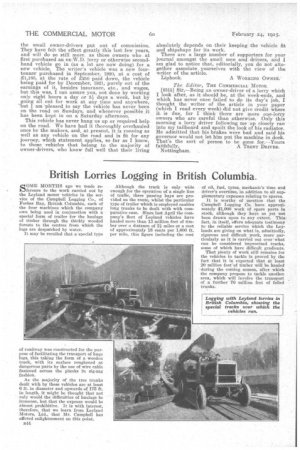British Lorries Logging in British Columbia
Page 28

If you've noticed an error in this article please click here to report it so we can fix it.
SOME MONTHS ago we made reference to the work carried out by the Leyland motor vehicles in the service of the Campbell Logging Co., of Forbes Bay, British Columbia, each of the four machines which the company own being used in conjunction with a special form of trailer for the haulage of timber through the thickly wooded forests to the centres from which the logs are despatched by water.
It may be recalled that a special type of roadway was constructed for the purpose of facilitating the transport of huge logs, this taking the form of a wooden track, with its surface roughened at dangerous parts by the use of wire cable fastened across the planks in zig-zag fashion.
As the majority of the tree trunks dealt with by these vehicles are at least 6 ft. in diameter and upwards of 175 ft. in length, it might be thought that not only would the difficulties of haulage be immense, but that the expense would be almost prohibitive. It is with interest, therefore, that we learn from Leyland Motors, Ltd., that Mr. Campbell has offered enlightenment on this point.
B44 Although the track is only wide enough for the operation of a single line of traffic, three passing bays are provided on the route, whilst the particular type of trailer which is employed enables long trunks to be dealt with with comparative ease. Since last April the company's fleet of Leyland vehicles have hauled more than 13 million feet of timber over a distance of 21 miles at a cost of approximately 18 cents per 1,000 ft. per mile, this figure including the cost of oil, fuel, tyres, mechanic's time and driver's overtime, in addition to all supplementary expenses relating to spares.
It is worthy of mention that the Campbell Logging Co. have approximately $1,000 work of spare parts in stock, although they have as yet not been drawn upon to any extent. This fact, in itself, offers adequate testimony to the reliable service wlaich the Leylands are giving on what is, admittedly, rigorous and difficult work, more' particularly as it is carried out over-what can be considered improvised tracks, some of which bare difficult gradients.
That plenty of work still remains for the vehicles to tackle is proved by the fact that it is' expected that at least 20 million feet of timber will be hauled during the coming_ season, after which the company propose to tackle another, area, which will involve the transport of a further 70 million feet of felled trunks.






























